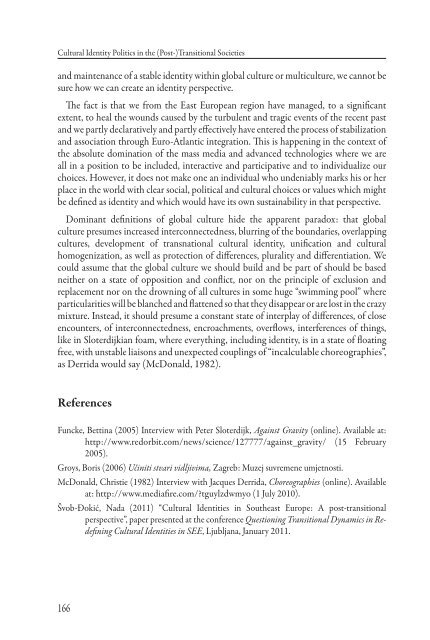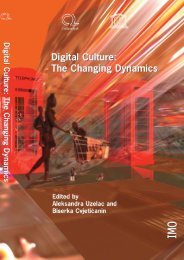free download in pdf format - Culturelink Network
free download in pdf format - Culturelink Network
free download in pdf format - Culturelink Network
You also want an ePaper? Increase the reach of your titles
YUMPU automatically turns print PDFs into web optimized ePapers that Google loves.
Cultural Identity Politics <strong>in</strong> the (Post-)Transitional Societies<br />
and ma<strong>in</strong>tenance of a stable identity with<strong>in</strong> global culture or multiculture, we cannot be<br />
sure how we can create an identity perspective.<br />
Th e fact is that we from the East European region have managed, to a signifi cant<br />
extent, to heal the wounds caused by the turbulent and tragic events of the recent past<br />
and we partly declaratively and partly eff ectively have entered the process of stabilization<br />
and association through Euro-Atlantic <strong>in</strong>tegration. Th is is happen<strong>in</strong>g <strong>in</strong> the context of<br />
the absolute dom<strong>in</strong>ation of the mass media and advanced technologies where we are<br />
all <strong>in</strong> a position to be <strong>in</strong>cluded, <strong>in</strong>teractive and participative and to <strong>in</strong>dividualize our<br />
choices. However, it does not make one an <strong>in</strong>dividual who undeniably marks his or her<br />
place <strong>in</strong> the world with clear social, political and cultural choices or values which might<br />
be defi ned as identity and which would have its own susta<strong>in</strong>ability <strong>in</strong> that perspective.<br />
Dom<strong>in</strong>ant defi nitions of global culture hide the apparent paradox: that global<br />
culture presumes <strong>in</strong>creased <strong>in</strong>terconnectedness, blurr<strong>in</strong>g of the boundaries, overlapp<strong>in</strong>g<br />
cultures, development of transnational cultural identity, unifi cation and cultural<br />
homogenization, as well as protection of diff erences, plurality and diff erentiation. We<br />
could assume that the global culture we should build and be part of should be based<br />
neither on a state of opposition and confl ict, nor on the pr<strong>in</strong>ciple of exclusion and<br />
replacement nor on the drown<strong>in</strong>g of all cultures <strong>in</strong> some huge “swimm<strong>in</strong>g pool” where<br />
particularities will be blanched and fl attened so that they disappear or are lost <strong>in</strong> the crazy<br />
mixture. Instead, it should presume a constant state of <strong>in</strong>terplay of diff erences, of close<br />
encounters, of <strong>in</strong>terconnectedness, encroachments, overfl ows, <strong>in</strong>terferences of th<strong>in</strong>gs,<br />
like <strong>in</strong> Sloterdijkian foam, where everyth<strong>in</strong>g, <strong>in</strong>clud<strong>in</strong>g identity, is <strong>in</strong> a state of fl oat<strong>in</strong>g<br />
<strong>free</strong>, with unstable liaisons and unexpected coupl<strong>in</strong>gs of “<strong>in</strong>calculable choreographies”,<br />
as Derrida would say (McDonald, 1982).<br />
References<br />
Funcke, Bett<strong>in</strong>a (2005) Interview with Peter Sloterdijk, Aga<strong>in</strong>st Gravity (onl<strong>in</strong>e). Available at:<br />
http://www.redorbit.com/news/science/127777/aga<strong>in</strong>st_gravity/ (15 February<br />
2005).<br />
Groys, Boris (2006) Uč<strong>in</strong>iti stvari vidljivima, Zagreb: Muzej suvremene umjetnosti.<br />
McDonald, Christie (1982) Interview with Jacques Derrida, Choreographies (onl<strong>in</strong>e). Available<br />
at: http://www.mediafi re.com/?tguylzdwmyo (1 July 2010).<br />
Švob-Đokić, Nada (2011) “Cultural Identities <strong>in</strong> Southeast Europe: A post-transitional<br />
perspective”, paper presented at the conference Question<strong>in</strong>g Transitional Dynamics <strong>in</strong> Redefi<br />
n<strong>in</strong>g Cultural Identities <strong>in</strong> SEE, Ljubljana, January 2011.<br />
166



